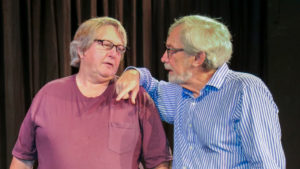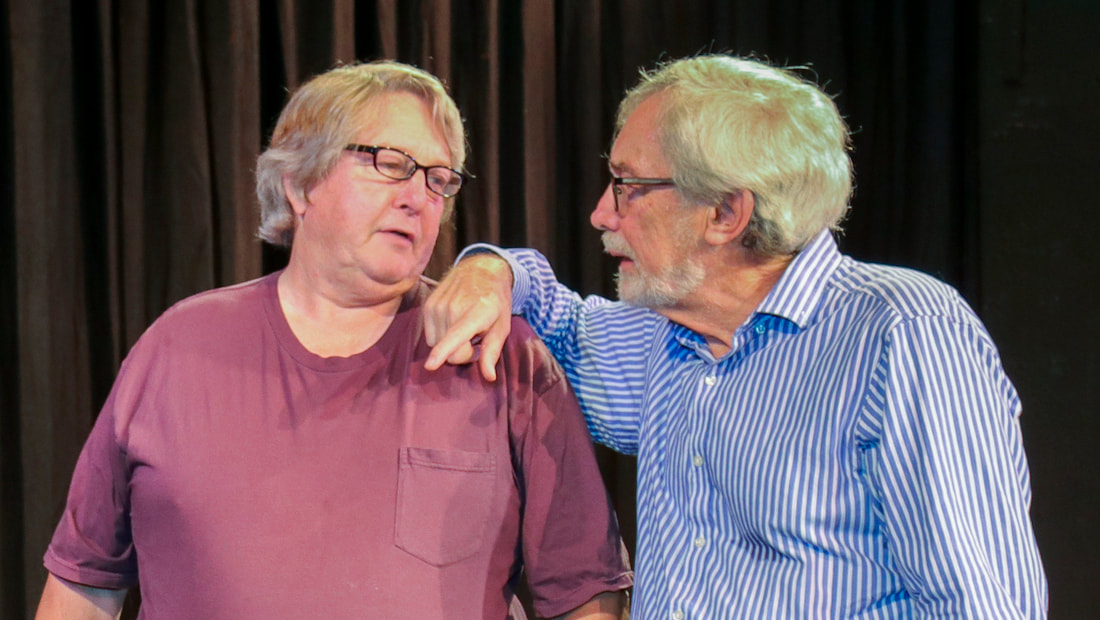handles ideological questions with humor and heart
By Kathleen Kaiser, Ojai Monthly
Photo by Stephen Adams
 One of the great cruelties of these times are the many ideological divides that split neighborhoods, communities, and even families. Most are manufactured in the name of patriotism, race or religion. To control people’s minds, the pretenders of righteousness prey on the young, the weak, the elderly, and more often, those in need—people they can exploit and use to their devious ends, or so many believe. The other side, the believers, strive with all their hearts that they are on the true path and see the others often as heathens.
One of the great cruelties of these times are the many ideological divides that split neighborhoods, communities, and even families. Most are manufactured in the name of patriotism, race or religion. To control people’s minds, the pretenders of righteousness prey on the young, the weak, the elderly, and more often, those in need—people they can exploit and use to their devious ends, or so many believe. The other side, the believers, strive with all their hearts that they are on the true path and see the others often as heathens.
Into this climate comes the world premiere of “Bless Your Heart” at the Ojai Art Center Theater in September, showing how one family with members of diametrically opposite points of view, can learn to accept, to renew their love, and to view the world through others eyes. And along the way, they can laugh at themselves and life. The story is a raucous mixture filled with high spirits, lots of laughter, and poignant moments centered around evolution, religion, and Elvis Presley.
Written by Ojaian Richard Camp, the Artistic Director of the Ojai Art Center Theater, the story is set in the South of the early 90’s and takes a deeper look at familial relationships. Camp brings his quick wit and perspective eye to examining how religion, science, and family are the pronounced topics in America today. And of course, there’s Elvis!
“What inspired the play was my upbringing,” said Camp. “My step-father became a Baptist preacher, with no training, no schooling. He didn’t get past the sixth grade. In the evangelical world, you get saved, and you get the call. Neither my mother nor my father had an educational path. I was not only the first person in my family to graduate from college, but I was also the first to graduate from high school. Education was an escape for me from this background.”
To help bring “Bless Your Heart” to life is the teaming of Camp and director Tom Eubanks whose personal views mirror some of the characters. They bring a special dynamic to the play; Camp comes from the side of science, and Eubanks, is a born-again believer. It’s an intriguing combination of the two men, playwright, and director, coming together.
“Tom surprised me by saying he wanted to direct,” said Camp, “since the play deals with evolution and religion.”
“As an Evangelical Christian myself,” said Eubanks, “I don’t think this play’s subject matter conflicts with religious beliefs. The comedic storyline illuminates the legalistic elements adopted by Christians, who have forgotten that we are saved by grace. Despite what non-Christians may think, Christians love to laugh at themselves. I’m the son and father of Evangelical pastors, I recognized these characters from my own life. Most of them are good people. And they are all funny as hell.”
The story is about a teacher of evolutionary biology (Thomas) who returns home to the Carolinas to try and stop his seventeen-year-old brother from marrying the eighteen-year-old preacher’s daughter. While there he clashes with his evangelical mother, his ex-preacher stepfather, and his no-nonsense, 11-times married aunt.
An outstanding cast of local favorites has been assembled for “Bless Your Heart.” Susan Kelejian portrays the mother, Martha, with David Nelson Taylor in the part of Thomas, the educated son returning home. The core of the play is based around their bond. Thomas, the professor, and his mother Martha are the dual protagonists. They serve as both sides of the core issue.
Michael Holden is the ex-preacher stepfather J.D., along with Julie Hamann as the eleven-time married tart-tongued, wickedly funny aunt who is a fanatic Elvis fan. The younger brother John David (portrayed by Chance Kelejian) is set to marry a preacher’s daughter Charlene, who turns out to be much more than she seems to be, (played by KiSea Katikka.)
“The play is very personal in that way,” adds Camp, “about Thomas escaping from that strict religious world. Acknowledging that background of an evangelical home, living it, being taught that way of thinking. But then going away to college and being exposed to a variety of schools of thought, I saw there were other ideas in the world one could experience and believe and sense. There was a thing called science that you could educate yourself about, philosophy and how the world operates, not the little cocoon that many people are born into in evangelical families.”
Don’t think you are walking into a storm of characters shouting past each other. The play is rich with humor but also touching and heart wrenching. It’s a dramedy with humor throughout.
“I didn’t want to be heavy-handed,” said Camp. “There’s a lot of things about family and religion that are funny, especially the aunt whose favorite phrase is ‘Butter my butt and call me a biscuit.’”
Elvis became a part of the story because Camp likes Elvis and his music, and so did his mother. One of Elvis’ songs is an old spiritual he recorded called “Farther Along.” The song makes a comment that captures what the play is exactly about according to Camp. ‘Farther along, we’ll know all about it. Farther along, we’ll understand why. Cheer up my brother, live in the sunshine. We’ll understand it all by and by.’ That is the theme of the play in an old gospel spiritual.
“I think there are a number of people in the Ojai audience who think about these issues, like what religion is doing to our country right now,” said Camp. “The difference in science and religion should be explored. I think the audiences will see that you can take a serious subject and deal with it humorously.”
“I want the Christian community to see this play,” adds Eubanks. “Some Christian friends heard it ‘bashed Christians.’ I hope by openly revealing that I am an Evangelical Christian and a conservative, that the Christian community will feel welcome to come and see the play.”
Characters Thomas and Martha are both redeemed by their love and compassion for each other. Their willingness to tolerate their differences through family challenges elevates their relationship with each other. They ultimately rise above their cesspool of opinions and dogma to find common ground.
“The playwright and the director,” said Eubanks, “are at opposite ends of the spectrum in religion, philosophy, politically, but we have a passion for theater. Therefore, we have found common ground and bring the wealth of our joint experiences to Ojai in “Bless Your Heart.”
“The entire play, from its theme to the delineation of characters is all about seeing,” says Camp. “The scientist says ’You have to see to believe.’ The Christian says ‘You have to believe to see.’ Who is right? As the great philosopher Ellen DeGeneres once said: “In the beginning there was nothing. And God said, let there be light. There was still nothing, but you could see it better.”

